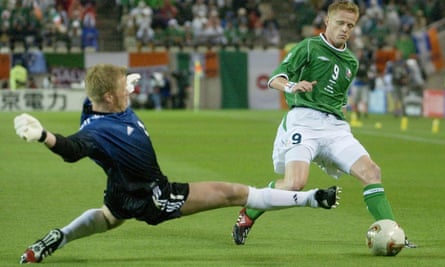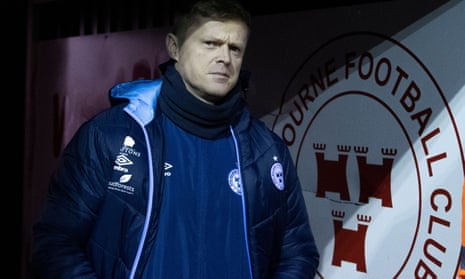Towards the end of last week, as a certain high-profile Sky Sports pundit insisted it was “no big deal” that he had not returned to Sunderland to resume a management career that has been on the backburner for over a decade, one of his former international teammates took charge of his first senior game. A big story in his native Ireland, it flew largely under the radar elsewhere.
Eight years after he drew the curtain on his career in English football, Damien Duff might have questioned the wisdom of his decision to take on the manager’s role at the League of Ireland side Shelbourne as he strode down the “wrong” side of a touchline he patrolled with such distinction as a player for Blackburn Rovers, Chelsea, Newcastle United and Fulham. In surroundings that could scarcely have been less glamorous, he began his new life as a gaffer on a filthy Friday night in the Dublin suburb of Drumcondra, where Tolka Park was taking a pounding from the wind and rain.
For Duff, this maiden foray into management constituted an extremely big deal, the 42-year-old having openly admitted he was terrified by the prospect of taking over a famous old Dublin club that has in recent years fallen upon hard times.
“Am I scared? Absolutely,” he’d told reporters at his unveiling in early November. “Do I feel uncomfortable? Absolutely. Going into the Shels first‑team role, is it going to be easy? No. Is it going to be comfortable? No. But it is going to give me 24/7 focus which is what I need. When I have an idle mind, like most people, it is not good for you.”
A two-time Premier League champion who represented his country 100 times in a playing career bookended by spells at Shelbourne’s great Dublin rivals Shamrock Rovers, Duff had been keeping his mind ticking over since retirement in a variety of coaching roles. There were stints working behind the scenes at Celtic and the Republic of Ireland, as well as jobs whipping into shape underage sides at Rovers and his current club Shels.
Not literally whipping, although he found himself in a minor spot of bother some years ago when some of the parents of his charges at Rovers took exception to the gruelling nature of a training regime which subjected their children to 6.30am starts and double sessions up to five times a week. “I get slaughtered, but that’s a dinosaur mentality,” Duff said when the issue was raised during an appearance as a pundit on RTE. “You have to train five times a week.” More pertinently, the kids didn’t mind.
While Duff’s pedigree as a player should go a long way towards convincing his adult charges, many of them part-timers supplementing their incomes with second jobs, to buy into the kind of work ethic that might make even a taskmaster as notorious as Marcelo Bielsa blanche, the club they represent will be unable to afford the kind of back room personnel and recovery aids all English Premier League clubs take for granted.
Only a few days ago, Duff revealed his managerial duties have stretched to finding accommodation and part-time work for his many new recruits, while taking others to hospital in his car for scans. “I haven’t had one day where it’s been a clear easy ride,” he said more than three months after taking the job. “There’s always been some shit to deal with. More often than not, more than one piece of shit.”

A household name working in a league where most players and managers habitually go unrecognised by the wider public outside their own front doors, Duff is working on an extremely tight budget at a club that was once a powerhouse of Irish football but has spent much of the past decade yo-yoing in and out of the League of Ireland’s top flight.
On a two-year contract, his immediate priority is keeping them in the Irish Premier League, even if he has already conceded “Shels will lose an awful lot of games” this season. Their first reverse, a 3-0 defeat at home to St Patrick’s Athletic in front of a capacity 4,100 crowd, is already on the board.
A deep thinker and perfectionist who demands the highest possible standards from his players on and off the pitch, Duff originally turned down the Shels job, because at the time he was offered it he was enjoying life on holiday with his family in the south of France and the thought of all the hassle it might entail simply did not appeal. Given a couple of days to mull over his decision, he soon changed his mind.
Despite being financially secure after a playing career in which he earned tens of millions, he felt compelled to demonstrate the courage of convictions – the importance of bravery and stepping out of one’s comfort zone – he was preaching to his own two children and the under-17s he was coaching at Shelbourne each day.
“I am bottom of the tree,” he told reporters. “I am not the best manager in the league. I have an awful lot to prove. In my first session with the Shelbourne first team I will probably be using bits from José Mourinho from 20 years ago. I will never change. I am still energetic, emotional. The players will soon learn that I never try being anything I am not.”
While learning the gospel of José from 20 years ago is likely to be more beneficial to Shelbourne’s players than any teachings the Portuguese has espoused in recent years, Duff has insisted that “if there’s a bottle out of place, I’m not going to say I’ve had enough of Shelbourne Football Club”. This suggests he might also have absorbed a nugget or two regarding the kind of managerial missteps he ought not to take from his former international skipper Roy Keane.

Comments (…)
Sign in or create your Guardian account to join the discussion